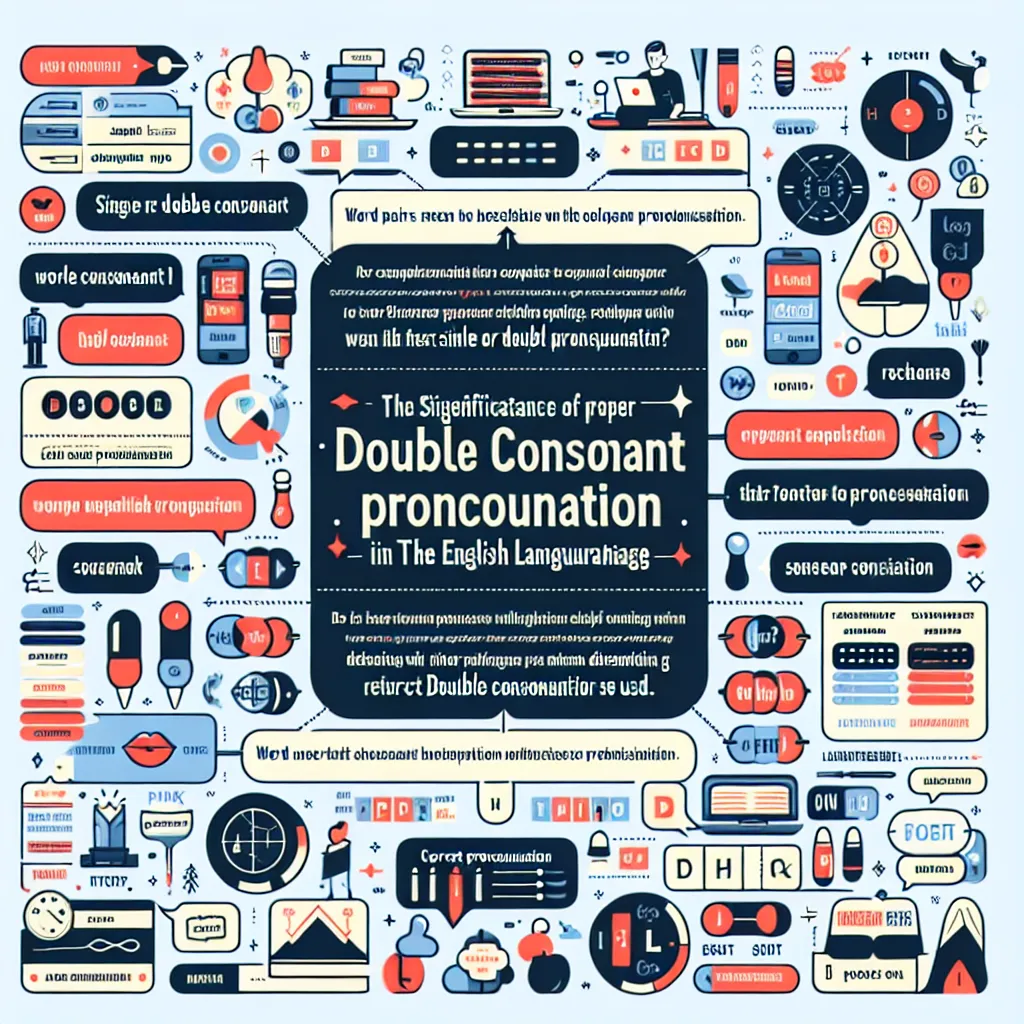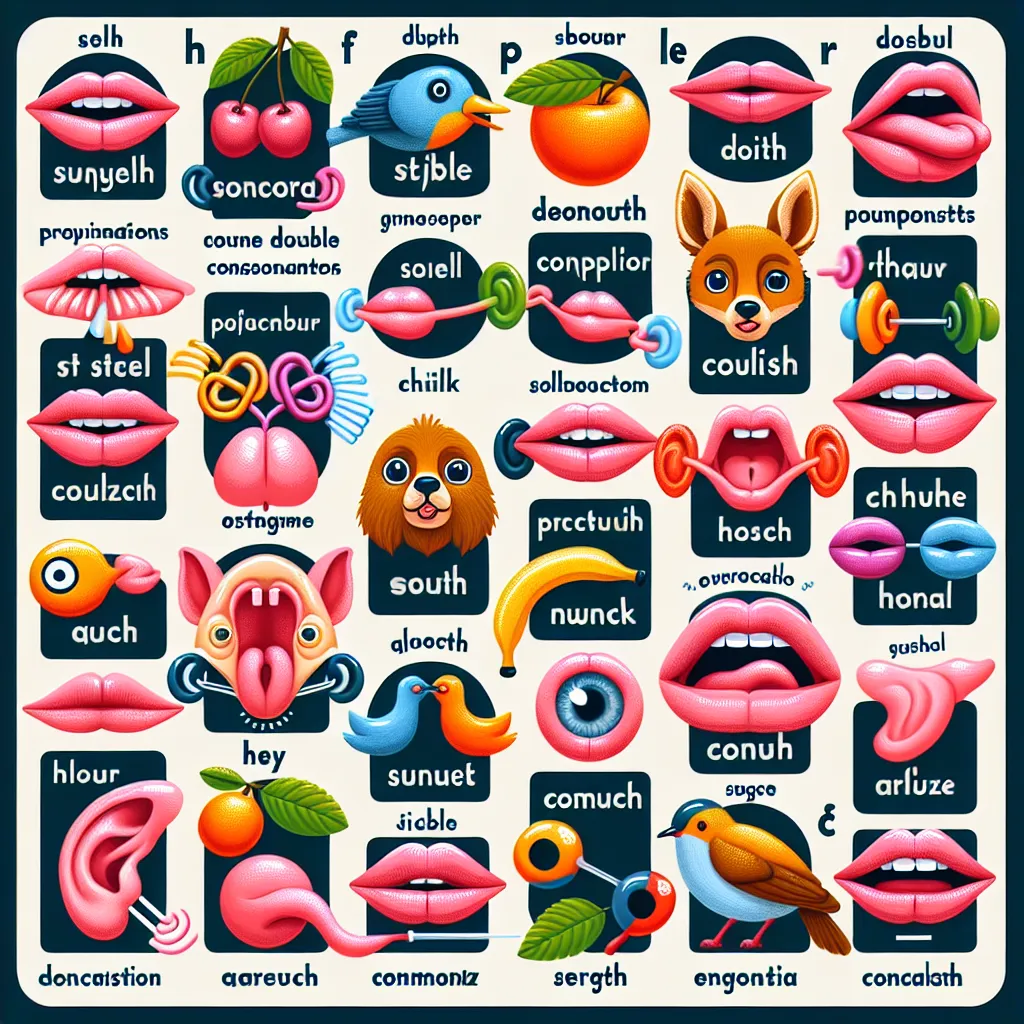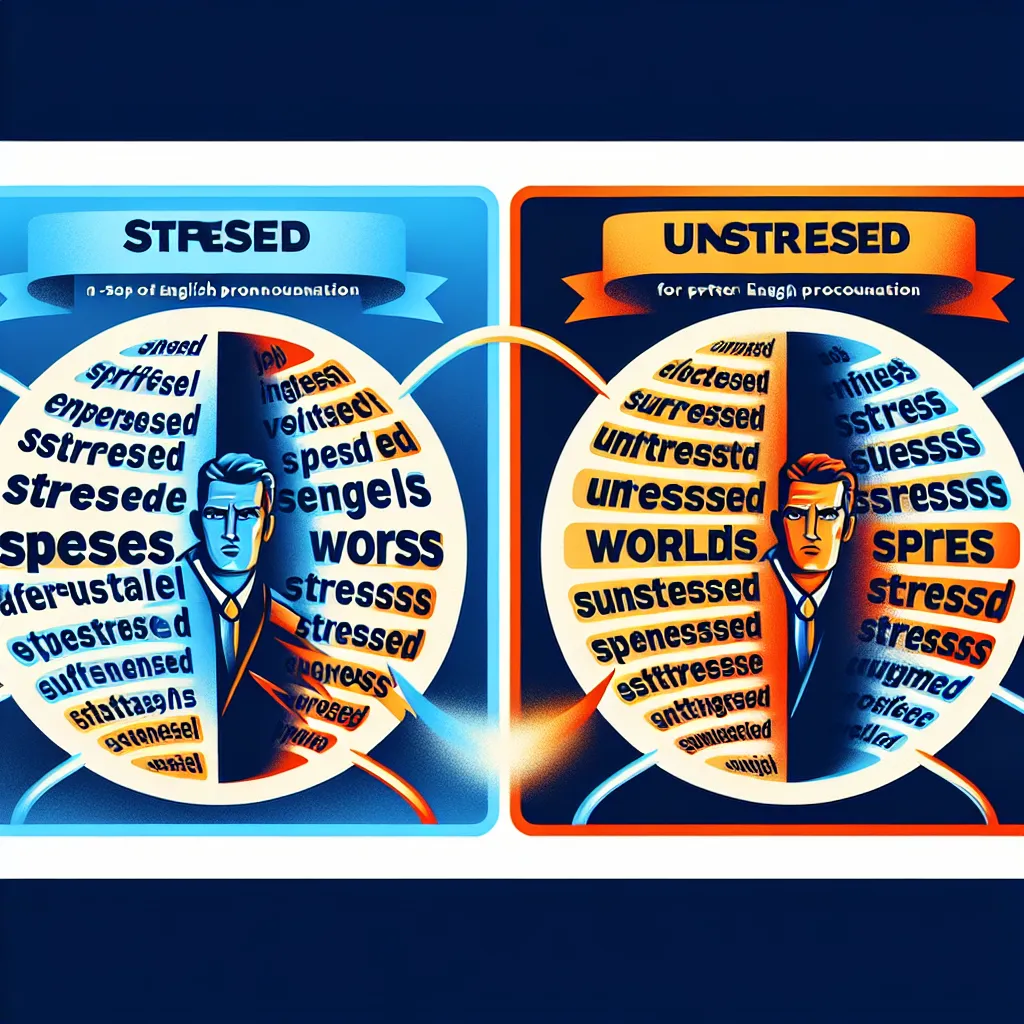Are you struggling with pronouncing English words that contain double consonants? You’re not alone! Many English learners find this aspect of pronunciation challenging. In this comprehensive guide, we’ll explore effective techniques and tips to help you master the pronunciation of words with double consonants, improving your overall English speaking skills.
Understanding Double Consonants in English
Double consonants are two identical consonant letters that appear next to each other in a word. Examples include “tt” in “letter,” “ss” in “miss,” and “ll” in “sell.” While these pairs of letters may seem intimidating, understanding how to pronounce them correctly is crucial for clear and accurate English speech.
Why Double Consonants Matter
Double consonants can significantly impact word pronunciation and meaning. In many cases, they affect the sound of the preceding vowel or the stress pattern of the word. Mastering their pronunciation will help you:
- Improve your overall English accent
- Avoid misunderstandings in communication
- Enhance your reading and spelling skills
- Boost your confidence in speaking English
 Double consonants importance
Double consonants importance
Common Rules for Pronouncing Double Consonants
Understanding the general rules for pronouncing double consonants will help you tackle most words confidently. Here are some key principles to remember:
1. No Double Sound
In most cases, double consonants are pronounced as a single sound. For example:
- “tt” in “button” is pronounced as a single “t” sound
- “ss” in “kiss” is pronounced as a single “s” sound
- “ll” in “tell” is pronounced as a single “l” sound
2. Affecting the Preceding Vowel
Double consonants often indicate that the preceding vowel should be pronounced short. Compare:
- “hopping” (short ‘o’ sound) vs. “hoping” (long ‘o’ sound)
- “dinner” (short ‘i’ sound) vs. “diner” (long ‘i’ sound)
3. Stress Patterns
In some words, double consonants can affect where the stress falls in the word. For example:
- “beGIN” vs. “BEGgar”
Specific Pronunciation Tips for Common Double Consonants
Let’s explore some specific double consonant combinations and how to pronounce them correctly:
Double T (tt)
- Usually pronounced as a single “t” sound
- In American English, it’s often pronounced as a soft “d” sound (alveolar flap) between vowels
- Examples: “better” (BE-der), “butter” (BUH-der)
Double S (ss)
- Typically pronounced as a single “s” sound
- Can sometimes be pronounced as “sh” in words of French origin
- Examples: “kiss” (single “s” sound), “tissue” (“sh” sound)
Double L (ll)
- Pronounced as a single “l” sound
- In American English, it’s often pronounced with a slight “w” sound after it
- Examples: “kill” (single “l” sound), “well” (with a slight “w” sound)
Double P (pp)
- Pronounced as a single “p” sound, but with more emphasis
- Examples: “happy,” “apple”
Double G (gg)
- Usually pronounced as a single “g” sound
- In some words, it can be pronounced as “j”
- Examples: “egg” (single “g” sound), “suggest” (pronounced as “j”)
 Double consonants examples
Double consonants examples
Common Mistakes and How to Avoid Them
Be aware of these common pitfalls when pronouncing words with double consonants:
- Over-emphasizing both consonants: Remember, in most cases, you should pronounce them as a single sound.
- Ignoring the effect on vowel sounds: Pay attention to how double consonants can shorten the preceding vowel.
- Misplacing stress: Be mindful of how double consonants can affect word stress patterns.
- Applying rules inconsistently: English has many exceptions, so always check the pronunciation of unfamiliar words.
Practice Exercises for Mastering Double Consonant Pronunciation
To improve your pronunciation of words with double consonants, try these exercises:
- Minimal Pairs Practice: Compare words that differ only in single vs. double consonants (e.g., “diner” vs. “dinner”).
- Tongue Twisters: Use phrases like “Betty bought a bit of butter” to practice double consonant sounds.
- Recording and Playback: Record yourself saying words with double consonants and compare your pronunciation to native speakers.
- Shadowing: Listen to native speakers and immediately repeat what they say, focusing on words with double consonants.
Phonemic Chart and Commonly Mispronounced Words
Understanding the International Phonetic Alphabet (IPA) can greatly aid in mastering double consonant pronunciation. Here’s a simplified phonemic chart focusing on consonant sounds:
/p/ – pin
/b/ – bin
/t/ – tin
/d/ – din
/k/ – kin
/g/ – gun
/f/ – fan
/v/ – van
/s/ – sin
/z/ – zip
/ʃ/ – shin
/ʒ/ – measure
/tʃ/ – chin
/dʒ/ – gin
/m/ – man
/n/ – nun
/ŋ/ – ring
/l/ – lin
/r/ – run
/w/ – win
/j/ – yes
/h/ – hat
Here are 10 words with double consonants that are often mispronounced, along with their correct pronunciations:
- Access – /ˈæk.ses/ (not /ək.ˈses/)
- Accommodate – /əˈkɒm.ə.deɪt/ (not /ə.ˈkɒm.ə.deɪt/)
- Occurrence – /əˈkʌr.əns/ (not /ˈɒk.jʊ.rəns/)
- Embarrass – /ɪmˈbær.əs/ (not /em.bəˈræs/)
- Necessary – /ˈnes.ə.ser.i/ (not /ˈnes.ə.ʃer.i/)
- Opportunity – /ˌɒp.əˈtjuː.nə.ti/ (not /ˌɒp.ərˈtuː.nə.ti/)
- Successful – /səkˈses.fəl/ (not /sək.ˈses.fʊl/)
- Appreciate – /əˈpriː.ʃi.eɪt/ (not /ə.ˈpriː.si.eɪt/)
- Occasion – /əˈkeɪ.ʒən/ (not /ˈɒk.ə.ʒən/)
- Recommend – /ˌrek.əˈmend/ (not /ˌriː.kə.ˈmend/)
Conclusion
Mastering the pronunciation of English words with double consonants takes practice and patience, but it’s an essential skill for clear and accurate English speech. By understanding the rules, practicing regularly, and being aware of common mistakes, you can significantly improve your pronunciation and overall English fluency.
Remember, consistency is key. Incorporate these techniques into your daily English practice, and don’t be afraid to ask native speakers or language teachers for feedback. With time and effort, you’ll find yourself pronouncing double consonant words with greater ease and confidence.
We’d love to hear about your experiences with pronouncing double consonants in English. Share your challenges and successes in the comments below, and check out our other articles on English pronunciation for more helpful tips and tricks!




